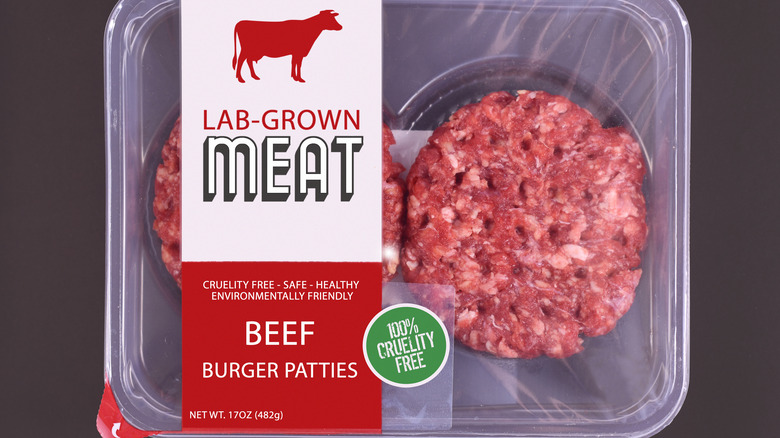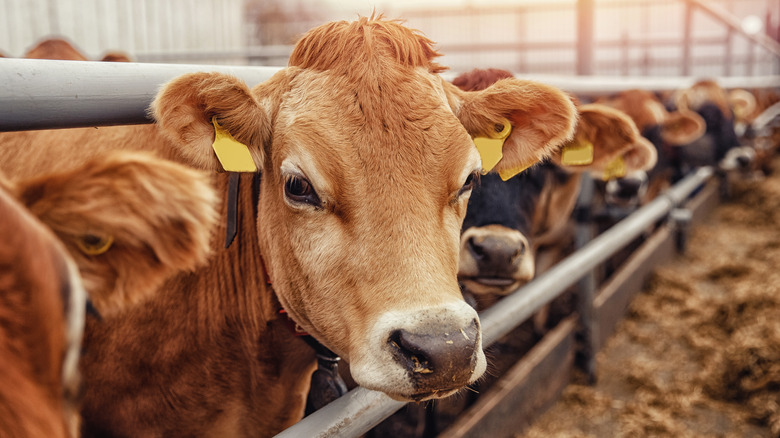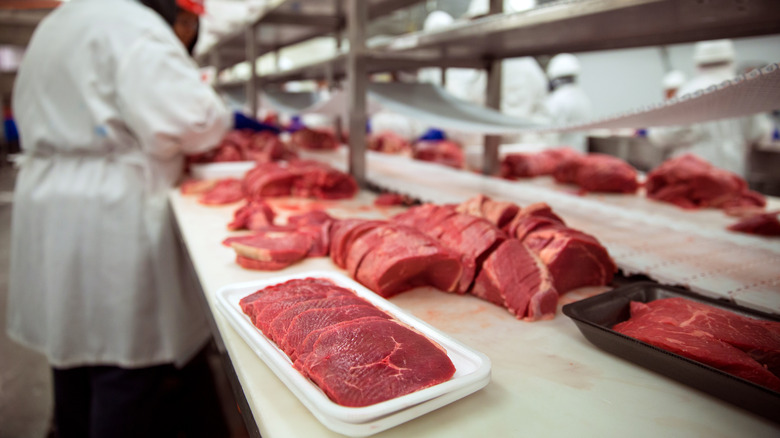Why The US May Be Seeing More Cultured Meat In The Future
The future of animal protein could lie in the hands of an innovative industry that has received the approval of environmentalists, animal rights activists, and deep-pocketed investors alike.
While the plant-based meat market has boomed in recent years, with companies like Beyond Meat and Impossible Foods releasing a slew of vegan products meant to resemble beef burgers, chicken nuggets, hot dogs, and more, the cultured meat market is still relatively unknown among consumers.
Unlike plant-based meat products, which are meant to simply resemble meat, cultured meat (which is also referred to as cultivated meat) is authentic animal meat created in a lab (via Good Food Institute). This futuristic form of protein, which requires no animal farming or rearing, is produced by cultivating animal cells in bioreactors; The cells are raised on a diet of a nutrient-rich cell culture before being harvested and packaged into commercial meat products.
This innovative technology was initially introduced to the public in 2013, when Dutch scientist Mark Post debuted the first lab-grown burger at a conference in London (via BBC). Post's burger, which was created in a lab using billions of lab-grown cells (with the help of funding from Google founder Sergey Brin), paved the way for the many cultured meat companies operating around the world today (via Global Newswire).
This company unveiled plans for the world's largest lab-grown meat facility
Now, one San Francisco-based meat maker intends to significantly expand the worldwide lab-grown meat supply with the help of a huge new facility. In a press release, the cultivated meat company GOOD Meat unveiled plans to construct the world's largest lab-grown meat facility, complete with ten 250,000-liter bioreactors that will have the potential to produce up to 30 million pounds of chicken and beef "without the need to slaughter a single animal."
GOOD Meat, which is owned by Eat Just, the producers of the popular plant-based egg product Just Egg, is partnering with bioreactor manufacturer ABEC to design, manufacture, and install the largest bioprocessing facility on the planet. Although the company hasn't settled on a location for the facility, the complex will be located somewhere in the United States. Last year, the company — launched in 2020 — secured $170 million in funding, which will help fund the construction of the ambitious project (via Bloomberg).
According to Josh Tetrick, CEO of Eat Just, the benefits of trading traditional farm-raised meat for the lab-grown alternative are numerous. "Cultivated meat matters because it will enable us to eat meat without all the harm, without bulldozing forests, without the need to slaughter an animal, without the need to use antibiotics, without accelerating zoonotic diseases," Tetrick told The Guardian. "I think our grandchildren are going to ask us about why we ate meat from slaughtered animals back in 2022."
Cultivated meat has been praised by animal rights activists
The livestock farming industry is one of the leading producers of greenhouse gas emissions worldwide. The International Journal of Environmental Research and Public Health has estimated that livestock is responsible for around 34 to 40% of global methane emissions, and Stanford University has found that livestock production creates 18% of all greenhouse gas emissions and occupies a quarter of the world's land.
In addition to the environmental benefits of lab-grown meat, scientists also believe that lab-grown meat could have significant health benefits compared to farm-raised meat. Once scientific study published in Nature Food found that cultured meat produced without antibiotics (which are less exposed to pathogens) could significantly decrease the number of foodborne illnesses.
Lab-grown meat has also been embraced by animal rights groups, like PETA, which has been a proponent of cultivated meat. In 2008, PETA president Ingrid Newkirk publicly pledged $1 million to the first scientific organization to develop a way to produce "commercially viable quantities" of lab-grown chicken meat. "People are surprised to learn that PETA is interested in lab-grown meat, but we have overcome our own revulsion at flesh-eating to champion a breakthrough that will mean a far kinder world for animals," Newkirk said.
The organization has championed the innovations of cultivated meat companies like UPSIDE Foods, which recently raised $400 million in investments for its lab-grown meat operation, and advocated for the concept of using cultivated meat in pet food (via PETA).
The USDA has yet to approve the sale of cultured meat
Despite the numerous potential benefits of lab-grown meat, the USDA has yet to approve the sale of cultivated meat products in the United States. However, the department recently gave $10 million in funding to Tufts University to establish a National Institute for Cellular Agriculture, issuing a statement that the "USDA's leadership continues to recognize the important role these technologies can play in combating climate change and adding much needed resiliency to our food system" (via Veg News).
According to Tetrick, GOOD Meat is optimistic that the USDA approval is forthcoming. "We've found the agency to be fully engaged, asking all the questions you'd expect, from cell identification to final product," the CEO told The Guardian. In the meantime, the company's meat-based products have already received regulatory approval and launched in Singapore, making the company the first cultivated meat manufacturer in the world to receive regulatory approval (according to a press release).
While it's still unclear when U.S. regulators will approve the sale of cultured meats — and whether those products will meet the taste standards of chefs and meat-loving home cooks alike — this innovative technology has the potential to offer a safe, sustainable, and animal-friendly path forward for the global meat industry.



